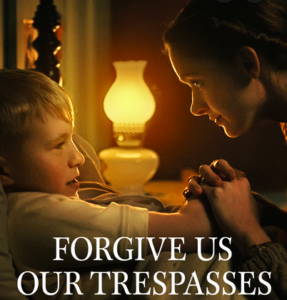By Eric George Tauber

CINCINNATI, Ohio — There are several relatively new films streaming on Netflix dealing with events leading up to, during and after the Holocaust. All are quite poignant and worthwhile, which is why I am taking the time to write about two of them here.
Forgive Us Our Trespasses is a short film (10 minutes) about a German boy named Peter played by Knox Gibson. At first, Peter looks like the picture perfect “Aryan” with blond hair, blue eyes, freckles and the cherubic face of a Hummel. He would be safe from the Nazis except that he lacks the lower half of his right arm. This handicap marks him as an “untermensch,” a burden that the state would be well rid of. His mother is also his teacher in their small, rural town and she is tasked with teaching the Nazi curriculum even though it turns her stomach. One particularly notable shot is of the classroom where more than half the chairs are empty. They never mention where their prior occupants are, but they don’t have to.

When we learn about the Holocaust, it is important to remember that the genocide didn’t start with the Jews. It began with the physically disabled and the mentally ill, 300,000 of whom were murdered. How any society treats their most vulnerable members speaks volumes about their values.
Many of us can relate to political differences causing familial rifts and lost friendships, especially in the last several years. We miss the affection we used to share, but how can you enjoy each other’s company when you just can’t talk to each other anymore?
Munich: The Edge of War brings us to the Munich talks of 1938 when the British Prime Minister Neville Chamberlain, French President Didier, Hitler and Mussolini met to avert war by sacrificing Czechoslovakia to the insatiably hungry Third Reich. Who was not invited to the talks? The leaders of Czechoslovakia.
Jeremy Irons paints a complex portrait of Neville Chamberlain, whom history tends to judge as a fool. He will be forever remembered for waving a document and proclaiming that he had achieved peace in their time as if paper could stop bullets and tanks. In this interpretation, Chamberlain knows full well that war is inevitable, but also that Britain is not ready for it. Thus, the sacrifice of Czechoslovakia was regrettably necessary to buy time.
To be honest, I didn’t quite believe Ulrich Matthes’ portrayal of Hitler. He was too composed, in control of his own worst impulses. But I loved one description of him by a British diplomat: “He smiled, which is even more disturbing than when he’s shouting.”
However, the leaders are not the main characters. The story revolves around two government lackeys, Hugh Legat and Paul von Hartmann (played by George MacKay and Jannis Niewöhner). They were good friends at Oxford, speaking each other’s languages fluently, but they haven’t spoken in years. Hartmann has the proof that Hitler’s war machine will not stop until he is stopped and he must get these papers into Legat’s hands before any treaties are signed. Legat must then convince Chamberlain that the talks are a fool’s errand, playing into Hitler’s hands.
Directed by Christian Schwochow, Munich achieves a difficult feat, giving us a nail-biting tale of suspense when we already know how it ends. With 150,000 Russian troops surrounding Ukraine, war seems inevitable. Are we really going into yet another long, protracted conflict? Or will Ukraine be sacrificed to an insatiable, megalomaniac?
There are other films that I’d like to tell you about, but they shall have to wait until my next article.
*
Eric George Tauber, a former San Diegan now residing in Cincinnati, is a teacher, performer, and a drama critic. He may be contacted via eric.tauber@sdjewishworld.com